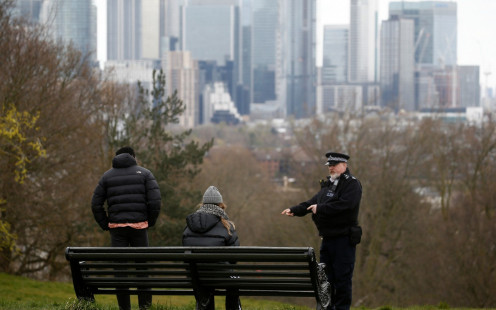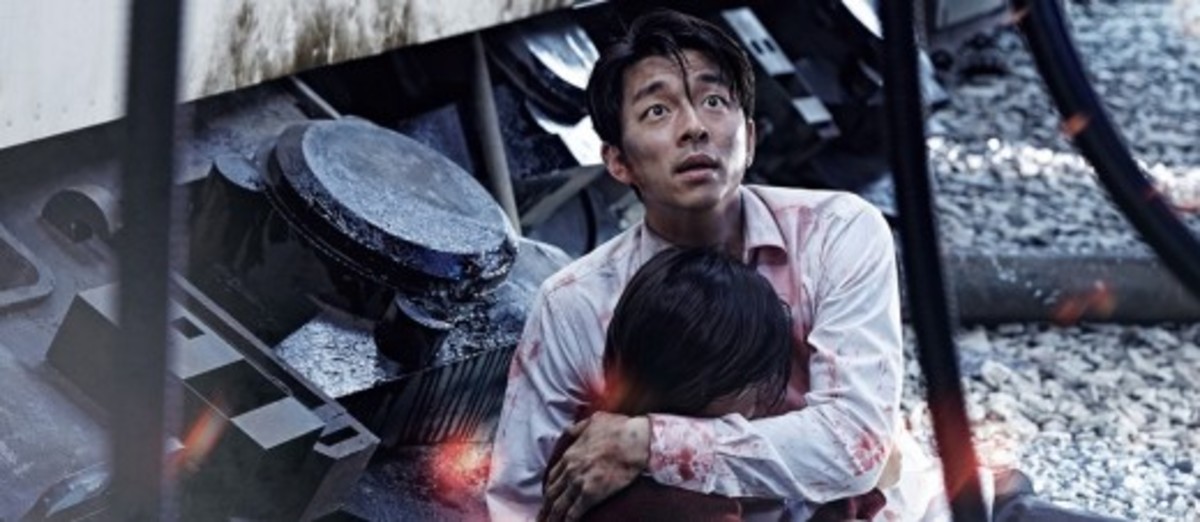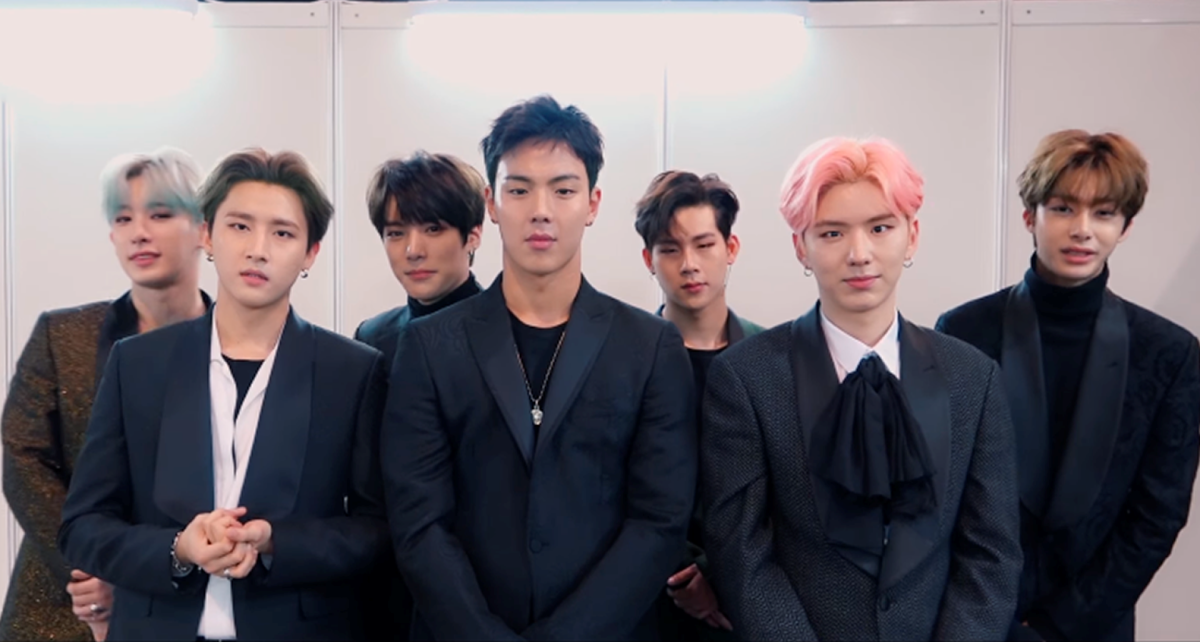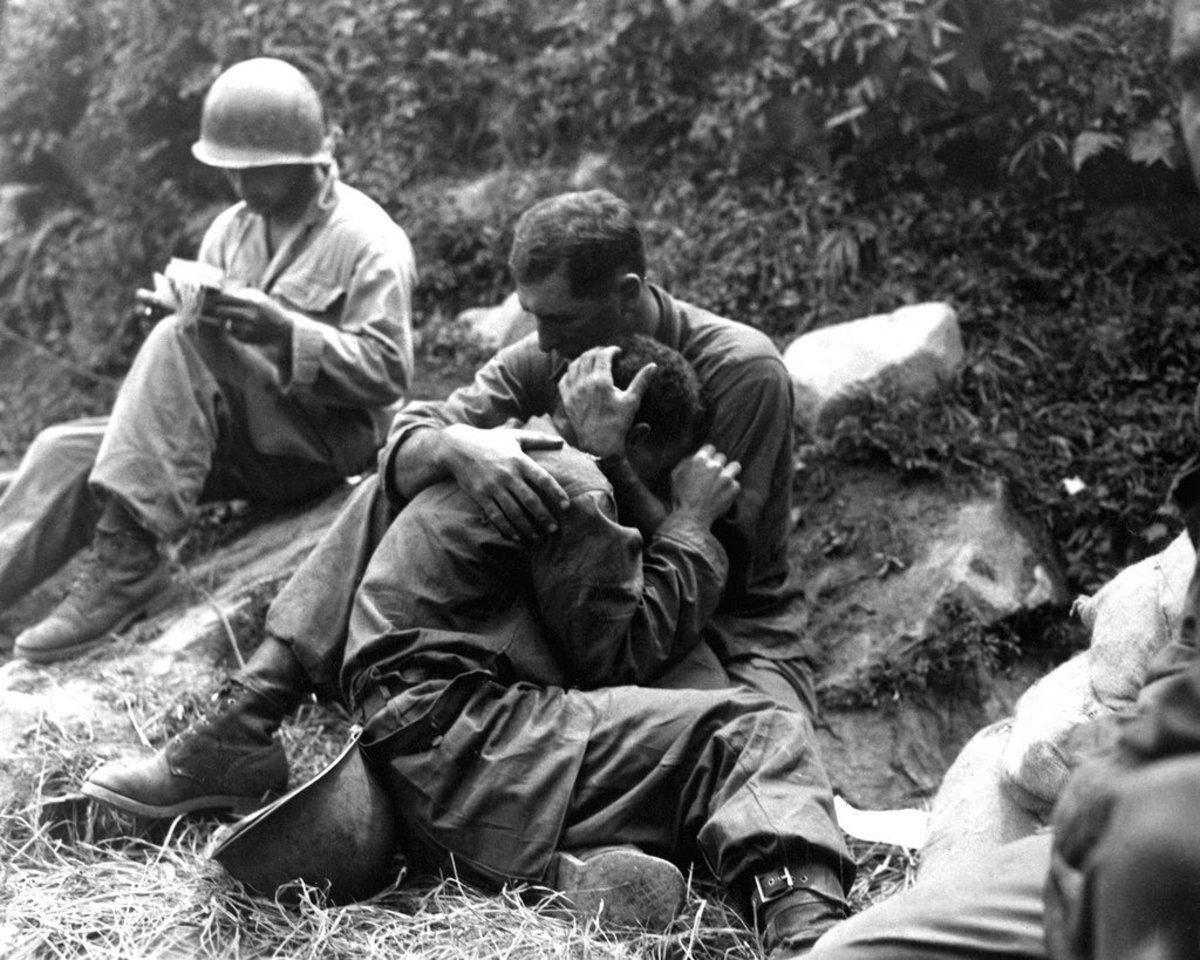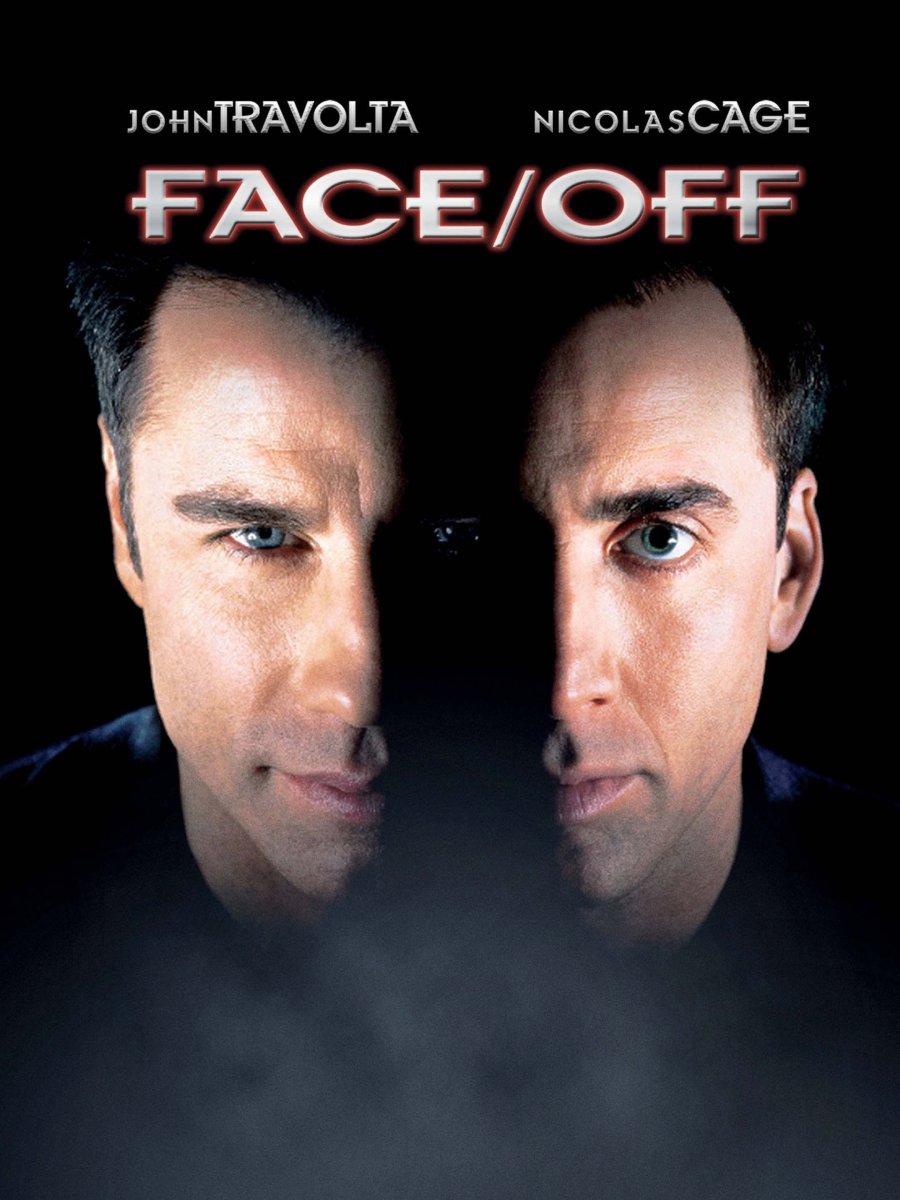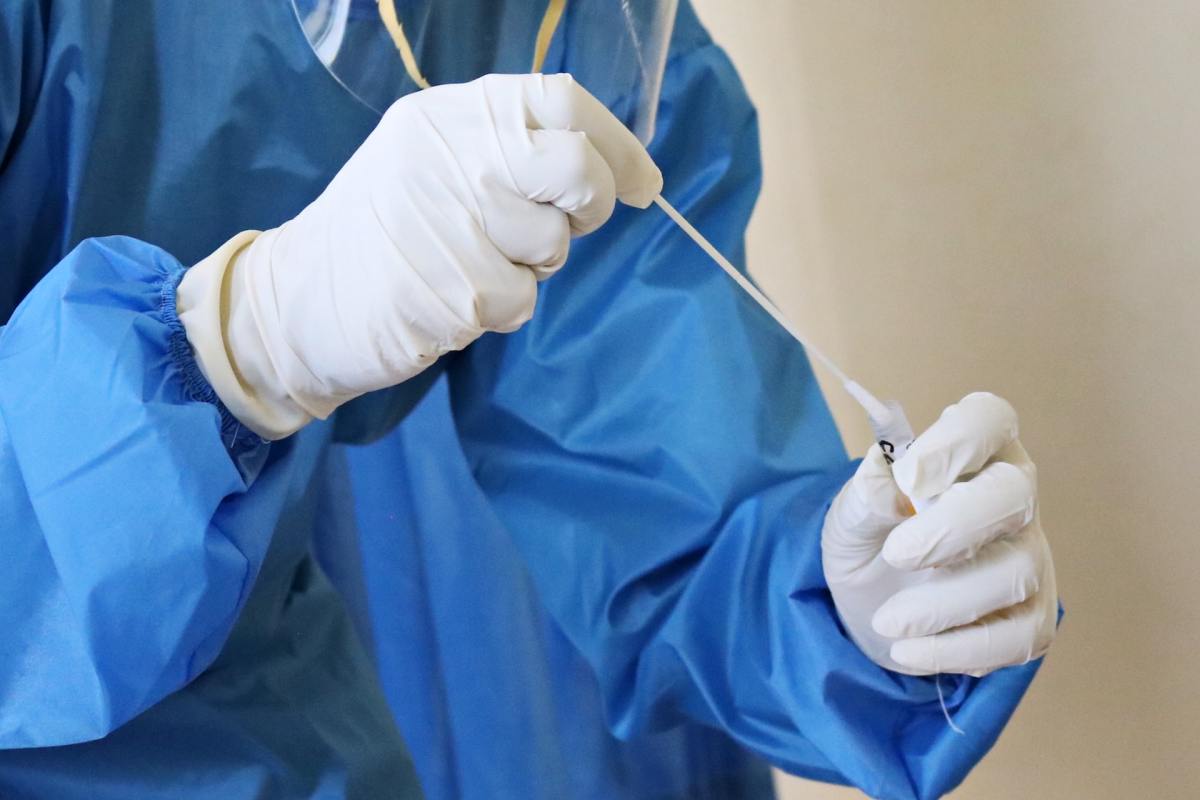Reporting From South Korea, What Can We Learn From South Korea's Robust Response to the Covid-19 Vurus?
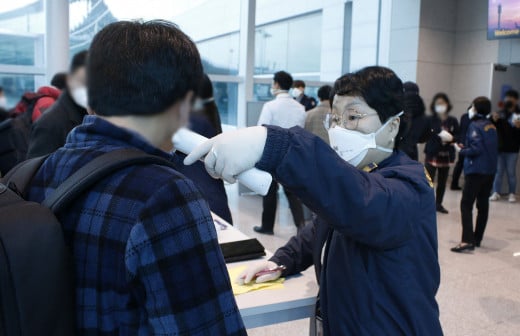
First of All, What Can We learn from South Korea in its COVID-19 Response?
South Korea and Taiwan are the top two countries most commended for their response to the COVID-19 virus, although Taiwan comes out as top because it completely shut down all incoming ports and airports from all countries as soon as it heard about the emergence, while South Korea only stopped incoming traffic from the City of Wuhan and its wider province of Hubei; which, has made the South Korean Government the target of criticism among their citizens - especially among the political opposition in recent days, and those citizens (particularly, the older generation) who view the Government as having economic, political and diplomatic considerations before the safety of them. The Government of the President, Mr. Moon Jae-in, have repeatedy said that their nation of South Korea is so inter-dependant on other countries, it could not enact a complete shutdown of incoming visitors, or the word which their own Foreign Minister used in a BBC interview with Andrew Marr, https://www.youtube.com/watch?v=ube88cLhDLc was "interconnected" to surrounding countries; however, their response still fails to answer how a leader of a country can place interconnectedness concerns, first, when a virus wants to invade the immune system of all its citizens. Of course, the most important consideration of any leader of a nation should always be to protect a nation's citizens.
1. Firstly, what we can learn from South Korea, is the mistake the Government made of not shutting down their borders, immediately, when they first heard about this disease, because all pathogens have no respect for open-borders - actually they prefer that policy. Even to this day, the Government is still allowing Chinese and other nationals of hotspot nations to pour through their borders. Therefore, the Number One Lesson is, all nations are reverting back to their borders and border-Controls as a much safer policy than the most failed experiment in modern-day politics called "Globalism."
Therefore, if there is one thing we have learned from this virus, is that "Globalism" or considerations of "interconnectedness" leaves a nation the most unprepared and vulnerable against such a fast-spreading pathogen as these corona-strands (Corona means "crown" and refers to the uncanny resemblance these pathogens or organisms have to the shape of a crown) of viruses such as SARS, MERS, and its most dangeous strand, the COVID-19. Today, all around the globe, every nation - even the most liberal-minded politicians - are changing from Globalists into Nationlists as they have been forced to - by the highly motivating emotion of stark-raving FEAR to survive this pandemic from death - to close down all its borders and put their "open-borders" policies on hold. Every nation has been forced to revert back to its borders and border-controls, and suddenly, overnight, change from Leftist Globalists to Conservatives - please let me say, an idea first inspired and institutionlised by God, himself when he fashioned every land and tongue into individual nations and states. You may not believe or agree with me evoking that term, or the character of "God" in this argument, but, you cannot disagree that the Biblical argument of nations keeping their own borders and not succumbing to Globalism is a much healthier option, although natural and controlled migration is still a healthy bi-product of certain groups who have very good reasons to move to other countries, such as when certain nations who are in need, for example, of better trained doctors and nurses etc - I will tell you, in a further down section, my own experience of receiving care from South Korean nurses.
Only in the last week of the first week of April, has the South Korean Government succumbed to forcing the quaranteeining of vistors from dangerous hotspots of this virus - where people flying-in from such hotspots as China and New York are going into a forced two-week quarantine.
2. Secondly, Number Two Lesson is, all countries should have tested, tested and tested, when they heard about this outbreak, and still need to test, test and test, in order to get ahead of this deadly COVID-19 Curve.
Despite these obvious mistakes, South Korea's response to the virus has been among the top two best responses; South Korea's robust response is good, chiefly because of the hugely stringent policy it enacted at the outset, internally, to contain the outbreak by identifying and quarantining infected individuals as quickly as possible, preventing them from perpetuating viral transmission. As we have seen in the cases of the United Kingdom and Italy, when Governments don't have a stringent containment policy in place, the disease spreads exponentially (meaning, it doubles every few days)
In the second largest city of South Korea, called Busan, a Phd Graduate, Dr. Justin Fendos who is a professor at Dongseo University in South Korea explains the importance of what he terms S.O.P. which is an abbreviation of, Standard Operating Procedure.
"So far, South Korea and Taiwan are among the few countries to have demonstrated robust and consistent SOPs. This is not surprising given that each has invested heavily in infectious disease control following prior experiences with SARS and MERS. South Korea’s SOP essentially calls for five steps: an aggressive and transparent information campaign, high volume testing, quarantine of infected individuals, treatment of those in need, and disinfection of contaminated environments. These may seem like obvious measures, but proper execution is ultimately what decides their effectiveness."
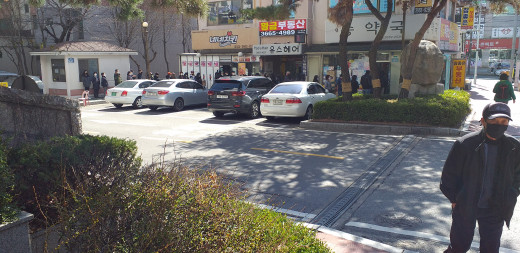
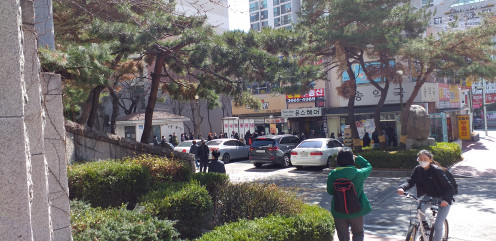
From this picture, above, your can see the long queue of people waiting to receive their rationed masks
The main reason South Korea was able to get ahead of the curve of this deadly virus' intentions was its robust testing system.
3. Number Three Lesson we can learn is South Korea has always led the world in its innovative medical expertise for many years - so, the result was, despite the mistakes that the Government initially made, just like Governments in Britain and the U.S.A., initially being wrong-footed, South Korea's most-excellent medical know-how and equipment mitigated much of that mess.
One way you can evidence how South Korea leads the way in its medical expertise is the number of Americans which choose South Korea as the place where it is willing to part with theirs dollars to be operated on in this country rather than their home-country; one of their considerations is, of course, that the operations are cheaper in South Korea, but the other consideration is the more advance level of medical expertise in both their dental procedures and general medical-operations. If you would like to challenge me in these facts, please feel free to comment below in the comments section, but may I ask that you keep the comments civil - free from both emotion and emotionally charged expletives, which I am sure you understand that word, without the need for me to give you an example.
From my own personal experience of being exposed to hospital treatment in South Korea, if you have enough dollars to pay for your treatment, here, be weary that the members of hospital staff who deal with you have not been trained in the art of personal care - or so it seems - or that is what I have experienced - in the art of what we call in England, "That Doctor had a good bedside-manner" or "That nurse has a good bed-side manner" which in South Korea, you may well be shocked to find that the brigade of nurses and even many doctors do not have even have a concept of what a "bedside-manner" is or can do for the relief of their patients, let alone any sign of a "bedside-manner." I remember when on one accasion, over twenty years ago, now, I was admitted by ambulance to a Korean hospital and I was ordered to hold my arm in the air for some reason while in the ambulance, en-route by a nurse who just shouted orders into my ear- like a Drill-Sergeant on parade - in her native language which at the time I could only glean-off her messages through her body language and tone; and when she felt I wasn't complying with her orders, she swiftly screamed into my face, even though at the time, I was only around 25 % in consciousness; obviously, her lack of bedside-manner had a long-lasting impression on me, that I am still able to remember it, over twenty years later. Some thing tells me that this particular nurse was not trained in even the most basic, decently human warmth, or what we call "bedside-manner" in my home-nation of England or in the British Isles; I mean, something tells me she was not even trained that there was such a concept in the school of Floreance Nightingdale. She seemed, as do an entire "army" of South Korean nurses to display a regimental approach to nursing-care which treats us patients like a number of a product; this may be due to cultural considerations or it might be due to the fact that, every where you go in South Korea, you are expected to pay for the health-care you receive; therefore, if, when this crisis blows over, you are considering a job in South Korea, please note, your pay will be taxed, of which a percentage of it, goes towards your National Insurance so that when you receive any hospital care in South Korea, if you have your Government-issued I.D., you can, at least enjoy a few dollars off your medical bill; compared to my home-country of Britain, where the National Health Service (the N.H.S.) is both completely free and beloved; along with all its flaws, however, there is still a basic level of "bedside-manner." On this note, then, I would hope that this Article I am writing would go some way of exposing this blind-spot in Korean medical care, especially when it is held up as an international gold-standard in some quarters, such as in the U.S.A. where medical-tourism to South Korea is an existing and growing market; maybe, this blind-spot can be excused by evoking cutural differences where the mass of her citizens do not expect any bedside-manners where public officialdom are concerned. But it wouldn't harm their medical professions in South Korea to undergo a mass training session - even if it's for just one day - on their day-off with a free meal of their standard bowl of rice and meat-and-veggies, and transport thrown-in; may I even suggest they call their one-day training session,
"WHAT IS A GOOD BEDSIDE MANNER?"
If you agree with me, or if you don't, please could you take a few moments to comment below in the comments box.
Anyway, getting back to South Korea's robust testing system, as an abc Article from the 27th February points out https://abcnews.go.com/international/massive-coronavirus-testing-program-south-korea-underscores-nimble/story?id=69226222 :
"Global health experts say the speed and scope of South Korea’s novel coronavirus diagnostic capability exhibit impressive and significant lab capabilities that no other countries, including the U.S., can match at the moment.
South Korea had tested a total of 66,652 people for the COVID-19 coronavirus virus as of 4 p.m. local time Thursday, whereas Japan had reported administering roughly 1,890 tests and the U.S. only 445. The huge discrepancy compared to other countries reflects how quickly South Korea’s numbers have been rising, experts say."
4. Fouthly, Mass Public Live-Information and Transparency.
Also, the South Korea Government have tried to answer the hundreds of questions surrounding the mysteries of this COVID-19 virus.
Transparent information is always the essential first step in any containment effort. Of course, not everyone in a country can be physically tested, but the important measure is to contain those who appear to have the virus or are carrying the virus. That's why testing is the key to combating this virus. To maximize the odds that testing is focused on the people mostly likely to be infected, an aggressive information campaign is needed. In South Korea, this campaign communicates two critical components:
risk factors and useful measures.
Risk factors refer to information about the immediate environment. Who around me has been infected? Did I unknowingly visit a convenience store with infected individuals? These are things people must know in order to make informed decisions about whether to get tested or not.
Other questions, such as, "Can I swim in a public swimming pool?" which, incidently, you can receive the answer to that question at the following Link, https://www.watersafetymagazine.com/coronavirus-covid-19-is-it-safe-o-go-swimming/, or the answers to these questions are provided by the government daily through press briefings, websites, and automated text messages, which constantly send out national citizens-enmass text messages which communicate the recent locations visited by newly diagnosed patients. Lists of restaurants, shops, and churches are accompanied by the approximate times of visitation, so people can quickly decide whether they might be at risk. Text messages arrive through a contact that is hard-coded into every phone so there is no question about its authenticity, alleviating concerns about pranks and false reports.
The messages tell you, for example, that Mr. Yohan Kim has been tested as positive for COVID-19 and he visted a bar in the Gangnam area of Seoul, last Tuesday. So anyone who has also visted this same bar, since, should report to a hospital or a Government agency and be tested. It tells you even where Mr. Kim lives - not his actual address but just the vicinity.
. It tells you even where Mr. Kim lives - not his actual address but just the vicinity, as well as his actvity of where he has visited and which shops, restaurants, hotels, he has been to - live. All this information is available online on National Government sites so citizens can tract what he is doing or where he is going live. These kind of very draconian laws were introduced after the MERS outbreak when South Korea was the worst affected nation after tthe Arabian Peninsula.
The preventative measures being taken now in response to COVID-19 in South Korea have so far involved no lockdowns, no roadblocks and no restriction on movement.
Trace, test and treat is the mantra. So far this country of over 50 million, I have seen the National response. Schools remain closed, offices are encouraging people to work from home, large gatherings have stopped.
ADVERTISEMENT
Other information include detailed explanations of the Standard Operating Procedure and general advice about viral transmission. This advice appears daily through television, newspaper, and internet ads, reminding people to avoid crowded places and use appropriate, preventative hygiene. All inputs together supply a heightened sense of clarity about how people can help protect each other and extinguish the outbreak. This information also functions as a heavy counterweight to rumours, myths, and misinformation, reducing the chances that people will be led astray into unhelpful practices.
Good information isn’t much use, of course, unless it is combined with effective virus testing. Here too, the government has been very decisive, making tests available nationwide by sending teams into rural areas and even setting up drive-through test centers in large cities like Daegu which was the City most effected in South Korea, a hotspot which erupted, due to the practices of a religious cult called, "Shincheonji."
As the Phd Graduate, Dr.Justin Fendos writes in his Article on March the 10th, 2020, March https://thediplomat.com/2020/03/lessons-from-south-koreas-covid-19-outbreak-the-good-bad-and-ugly/ .
"Last week, the Ministry of Justice revealed 42 Shincheonji members had returned from Wuhan in January, making it extremely likely that the original virus carriers were among this group. Although not all details have been released to the public, it appears the Shincheonji organization also tried to hide the fact that its members were infected, contributing significantly to high outbreak numbers in Daegu and surrounding Gyeong-buk province, which together account for over 85 percent of all South Korean cases. Shincheonji’s head priest has since apologized by bowing before the media.
At the very least, these facts illustrate just how important it is for religious establishments to cooperate with containment efforts. Health authorities in other countries are strongly advised to reach out to their religious colleagues well in advance of an outbreak to share information and prevent a repeat of this sad story."
Anyway, in spite of this cult, test volume and speed are essential for containing an outbreak. To this effect, South Korea currently has a daily capacity of 20,000 tests, the most of any country. The results are quick too, reported by text message within 24 hours.
As Dr. Justin Fendos further points out,
"Every expert I have spoken to, domestic and abroad, agrees that South Korea’s information and testing are nothing short of enviable. The quality of these systems, however, doesn’t mean much unless the public is willing to use them. It is here that the murkier issue of voluntary compliance rears its head, bringing along essential considerations of culture and religion.
The truth of the matter is that testing, quarantine, and treatment depend on voluntary public cooperation. If people don’t want to get tested, no amount of text messages will change their minds. A few media outlets have already noted that quarantines are never perfect. This is true, but at the same time, a higher rate of compliance will inevitably bring about a faster end to outbreaks, meaning cooperation saves lives."
5. Fifthly, the widespread and national recommendation to all its citizens and vistors to always wear a proper mask when going outside.
In South Korea, if I go outside, I have to wear a mask. Of course, I am not fined if I do not wear one, but it is not recommended, especially, if, like me, I am a foreigner, where you tend to stick-out, and more so without a mask!
If you go outside in South Korea, over 99% of the population wear masks as they believe this mitigates the spread, or they are just following the advice of their Government. The issue of masks and the dangers of over-use or panic-buying has led to the Government telling its citizens who reside in the country that they can have Government issued masks on certain days of the week, corresponding with the last two numbers of their Korean National I.D.number.
When I drive past pharmacies or walk past them, there is usually a long line of people waiting for their rationed masks. There is a picture I took of one line outside a pharmacy, you can see at the top of this Article. Here in South Korea, for me, the FEAR-FACTOR among the public is palatable more than the disease, and in these times we are facing today, we have to be careful that the solution does not do more damage than the desease.
As the former President of the United States, Franklin Delano Roosevelt said, during the 1929 Stock Market crash and the subsequent Great Depression of the 1930s
"The only thing we have to fear, is fear, itself."
In South Korea, when you go outside, you can see, occasionally, public banners across pavements and roads that, Number One, you must wear a mask; Number Two, if you sneeze, you must place your arm up to your face, or sneeze and cough into a tissue, which you must dispose of, immediately. And Number Three, you must wash your hands, regularly.
In my home-nation, of Britain, the Government's main message is, "Stay At Home, Save Lives, Protect the N.H.S." (the National Health Service) while their other less clearer national messages have been:
Stay at home to work unless you cannot; Only go out for medical and food supplies, or to take care of family or friends who need your care, and if you go out, more than one-person gathering are illegal, except couples. In the previous ten days, the Government rushed through emergency legislation giving police forces up and down the country new powers to issue fines, and arrest those who flout the law - that a person can only go out if they have a good reason to be out, and not more than one person; and within a "safe" distance of not more than two meters apart from other persons; and only romantic-couples or married-couples can be together, walking; and if you are a couple or members of a family who live in different houses, the Government have asked that you live in one house, together, to mitigate the spread of this disease; and you can only go outside for physical exercise once a day, or to walk your dog.
In the U.K., all shops have been forced to close down, except those which are neccesary such as groceries (shops which stock food and essentials) and pharmacies. While, where I live in South Korea, there is only a Lockdown in place by the Government on all public schools, while the churches have been asked to close their public worship services, for now.
This means, I have not been able to teach English in public schools for a month, from my company; I work for an education-agency which supplies me as a teacher to Korean public schools, and when I telephoned them to ask if they could help me, as I have been forced to stay at home for the previous month of March and do not receive any pay, including April, they told me, flatly, that they cannot give me compensation for being at home on Lockdown. The response I received from one of their Managers was,
"We cannot pay you, if you don't work."
Therefore, I have no souce of income, now, even though I have three children and a wife to support, so that is the reason I have resorted to my writing and penning Articles about my experience, and life in general. I hope you find these Articles helpful, and if you wish to say or do something to mitigate my family's loss, please note my e-mail is christobriscoe@gmail.com of which I have a paypal account under this e-mail address, if you have a desire to help financially.
THANK YOU FOR READING THIS, AND A BIG THANK YOU FOR WHATEVER SUPPORT YOU CAN OFFER, whether in prayers or other support, such as sharing this Article, I give you a BIG THANK YOU.
In Britain, today, for the previous two weeks, Britain has been in Lockdown with the one police force in Derbyshire even resorting to using drone cameras.
